TRANSLATED FROM THE HINDI BY AYUSHEE ARORA
This incident relates to my Father. It also relates to my dreams, the city and the innate fear of the city as well.
My Father was fifty-five years old at that time, with a frail, thin body. His hair was completely white like maize- husk. His hair looked like somebody had kept wad of cotton on his head. He used to think a lot but spoke very little. Whenever he did speak, we felt like sighing in relief, as if were letting go of a long-delayed breath. Along with relief, we also felt fear. He was a big mystery for us children. We knew that he possessed the treasure of all knowledge in the world. We knew that he could speak all the languages of the world. The world, like knew him and feared him, but also, immensely respected him.
We were proud to be his children. Sometimes, once a year or so, he would take us out for a stroll in the evening. Before leaving, he would fill his mouth with tobacco. Due to the tobacco, he couldn’t speak much. He remained silent. This silence seemed very solemn, dignified, mysterious, and heavy to us. Sometimes, my younger sister wanted to ask him something on the way, so I would immediately try to answer her, so that Father wouldn’t have to speak.
This task was quite difficult and risky. Because I knew that if my answer was wrong, Father would have to speak. Speaking troubled him. First, he had to remove the tobacco quid, then he had to cover a difficult distance from the world he lived in to come here. Besides, there was nothing special in my sister’s questions. Like, if she asked what the bird sitting on the dry branch in front was called, I would answer promptly. Since I knew all the birds, I could tell that it was a blue jay and should be seen regularly after since Dussehra. I always tried to keep Father at ease, and keep him thinking.
My mother and I both made every effort to keep Father at peace in his own world, so that he wouldn’t forcibly be taken out from there. Although that world was very mysterious for us, Father addressed many of the problems of our home and our lives while staying there. Like when my school fees were due, at that time, we had lost the last glass at our house, and everyone was drinking water out of a copper vessel. Father remained completely silent for two days. Mother also started wondering if Father had completely forgotten about the school fees or if the solution to it wasn’t within his control. But on the third day, early in the morning, Father gave me a letter in an envelope and sent me to the city doctor, Dr Pant. I was very surprised when the doctor gave me a cold beverage, took me inside his house to introduce me to his son, and gave me three hundred rupees.
We were proud of Father, loved him, feared him, and his presence felt like we were living in a fortress. Such a fortress, surrounded by deep moats, with very tall towers, walls made of tough red rocks, and impregnable against any external attacks.
Father was a very strong fortress. We used to forget everything and play on his ramparts, run around. And at night, I used to sleep deeply.
But that evening, when Father returned after strolling outside there was a bandage on his ankle. Shortly afterwards, many people from the village arrived there. It turned out that Father had been bitten by a monitor lizard in the jungle.
We all knew that a person couldn’t survive a monitor lizard’s bite. In the dim, smoky light of the lantern at night, many people from the village had gathered in our courtyard. Father was sitting on the ground, in between them. Then the barber from the nearby village also arrived. He used to extract poison using the leaves and thorns of the castor plant.
I had seen a monitor lizard once before.
It was heading towards the pond, from amidst the piles of large rocks by the pond, which would become scorching hot in the afternoon. It was emerging from a crack in one of those rocks and moving towards the water to drink.
Thano was with me. He explained that it was a monitor lizard, containing a hundred times more poison than a black cobra. He also told me that while a snake only bites when someone steps on it or intentionally disturbs it, a monitor lizard runs as soon as it’s spotted. It retreats. To avoid it, one should never run straight. One should run zigzag, take turns, and run in circles.
Actually, when a person runs, they not only leave footprints on the ground but also their scent in the dust. The monitor lizard follows this scent. Thano explained that to confuse the monitor lizard, one should first run close, then quickly run a little farther away, and repeat this several times. The monitor lizard, sniffing around, will run faster where there are footprints nearby, and when it reaches where the person leaped, it will get confused. It will keep wandering until it finds the next footprints and the scent embedded in them.
We knew two more things about the monitor lizard. Firstly, as soon as it bites a person, it immediately urinates at the same spot, and its urine contains the poison. If one wants to survive, they should either jump into a river, well, or pond before the monitor lizard urinates, or they should kill it before it does so.
The second thing is that the monitor lizard only runs to bite when it senses someone looking at it. If you see a monitor lizard, never make eye contact with it. Upon eye contact, it identifies the person’s scent and then starts chasing them. Even if a person circles the whole world, the monitor lizard will keep following them.
I, like all the other children, was very afraid of the monitor lizard at that time. The most dangerous characters in my nightmares were only two—the elephant and the monitor lizard. While the elephant would eventually get tired of running, and I would climb up a tree to save myself, or I would start flying, but the monitor lizard would always trap me in its gaze. In my dreams, I would try not to make eye contact with it, but it would look at me with such familiar eyes that I couldn’t stop myself, and as soon as our eyes met, its gaze would change—it would start running, and I would start running.
I would run in circles, quickly darting nearby and suddenly making long jumps, trying to fly, climbing to a high place, but despite a thousand attempts, it wouldn’t fall into the trap. It seemed very cunning, intelligent, clever, and dangerous to me. I felt like it knew me very well. The shine of recognition in its eyes for me made me feel like it was an enemy who knew every thought that crossed my mind.
My most terrifying, torturous, fearful, and restless dream was this. As I ran, my entire body would tire out, my lungs would fill up, I would be drenched in sweat, and a very frightening, deafening death would start to get very close to me. I would scream loudly, crying out for Father, Thanu, or Mother, and then I would realize that it was a dream. But even after realizing it, I knew very well that I couldn’t escape from this death. Not death— a horrifying, excruciating death inflicted by the monitor lizard—and in that situation, I would try to wake up in my dream in some way. I would exert all my strength, open my eyes inside the dream, try to see the light, and speak loudly. Many times, I would successfully wake up at exactly the right moment.
Mother used to say that I have a habit of talking and screaming in my dreams. Many times, she had seen me crying in my sleep. In such situations, she should have woken me up, but she would pat my forehead, cover me with a blanket, and leave me alone in that terrifying world. I would run, scream, trying to escape from my death—or rather, my murder—in my weakened attempt to survive.
However, gradually I had learned from experience that my voice was my biggest weapon in such situations, which could save me from the monitor lizard. But unfortunately, every time, the memory of this weapon would come to me only at the very last moment. When it was just about to capture me.
Clammy, death laced breaths would start to touch me, filling me with the intoxication of death, and in the terrifying darkness, I would feel surrounded, feeling like there was no solid ground beneath me—I was in the air, and that moment would come when my life is about to end. Then, in this very short and delicate moment, the memory of this weapon would come to me, and I would start speaking loudly, and with the help of this voice, I would emerge from the dream. I would wake up.
Many times, my mother would ask me what happened to me. At that time, I didn’t have adequate vocabulary to tell her everything, each thing, in the same way. I was well aware of my incapacity, and for this reason, I would be filled with a strange tension, restlessness, and helplessness. In the end, I could only say that it was a very scary dream.
I don’t know why I suspected that it was the same monitor lizard that had bitten my Father, the one I recognized and the one that appeared in my dreams.
But one good thing happened: as soon as the monitor lizard bit my Father and ran away, my Father chased it and killed it. It was certain that if they hadn’t killed it immediately, it would have urinated, and my Father wouldn’t have survived. Then my Father’s safety no longer worried me as much. Rather, feelings of relief and liberation were slowly growing inside me. The reason being, first, my Father immediately killed the monitor lizard, and second, my most dangerous, familiar enemy had finally died. Its killing was done, and now I could roam freely inside my dreams, anywhere, without any fear, whistling merrily.
That night, there was a crowd in our courtyard until late. People hovered over Father, chanted incantations, and the spiritual cleansing continued. The wound from the bite was torn open, blood was drawn out, and the wound was filled with the red medicine (potassium permanganate) used to disinfect it. I was relieved.
The next morning, Father had to go to the city. He had been summoned for a court appearance. Buses passed through the village road, about two kilometres away from our village, to go to the city. Hardly two or three buses used to ply on this route. It was fortunate that as soon as Father reached the road, a tractor from the nearby village going to the city was found. The people sitting in the tractor were familiar faces. The tractor was to reach the city in about two and a half hours. That is, well before the court opened.
On the way, the conversation about the monitor lizard came up. Father showed his wound to those people. Pandit Ram Avatar was also in the tractor. He explained that a special characteristic of the monitor lizard’s venom is that sometimes, twenty-four hours later, exactly at the same time as the previous day when the monitor lizard bites someone, its effect is shown. Therefore, Father should not be complacent yet. The people in the tractor drew Father’s attention to another big mistake. They said that it was indeed right of Father to immediately kill the monitor lizard, but even after that, he should not have let it go like that. It should have at least been burnt.
They said that many insects and creatures come alive again in the moon’s light, during the night. There is nectar in the dew and cold in the moonlight, and many times it has been seen that the snake, which is thought to be dead and thrown away at night, its body soaked in the cold of the moon, comes alive again and escapes. Then it remains consumed with the desire for revenge forever.
The people suspected that if the monitor lizard urinated after waking up at night, Father might get affected by its venom exactly twenty-four hours later, at the same hour. They advised Father to return from there and if by chance, the carcass of that monitor lizard was found there, it should be properly burnt. But Father explained to them how important the court appearance was. This was the third summons. And if he didn’t appear in court this time as well, there was a fear of a non-bailable warrant being issued. The summons was also related to our house where our family lived. The lawyer hadn’t even been paid for the last two appearances and if he showed negligence and the judge got angry, he could initiate legal proceedings against us.
The precarious situation was such that if Father had gotten off the tractor to burn the carcass of the monitor lizard from there and returned to the village, he would have been arrested under the non-bailable warrant and our house would have been confiscated. The court would have been against us.
However, Pandit Ram Autar was also a doctor. Apart from the astrological almanac, he had extensive knowledge of herbs. He suggested that there was a way by which Father could attend the court hearing and still be saved from the monitor lizard’s venom after twenty-four hours. He explained that the essence of Charak lies in this verse: poison is the remedy for poison. If datura seeds were found somewhere, they could prepare an antidote for the monitor lizard’s venom.
The tractor was stopped in the next village, Samatpur, and datura plants were finally found in an oilman’s field. After grinding the datura seeds and boiling them with old copper coins, a concoction was prepared. The concoction was very bitter, so it was mixed in tea.
The concoction was very bitter, so it was mixed in tea and Father was made to drink that tea. After that, everyone was reassured. All possible attempts to rescue Father from the danger had been made.
I also knew a third thing about the monitor lizard, which suddenly came to mind many hours after Father had left. This third piece of information was similar to the story of the snake, which ultimately led to the invention of the camera.
It was believed that if a man is killing a snake, then just before his death, the snake, for the last time, looks very closely at the face of his killer. The man is killing it, and the snake is recording each detail of his killer’s face very carefully in its inner eyelids. After the snake’s death, the picture of that man is clearly recorded on the inner eyelids of the snake.
Later, after the man leaves, the other snake comes and looks through the eyes of that dead snake, and in this way, the murderer is identified. All the snakes start recognizing him. Then wherever he goes, they stay there in anticipation of revenge. Every snake becomes his enemy.
I suspected that Father’s face would be recorded on the inner eyelids of the dead monitor lizard. Another monitor lizard would come and peek through the eyes of that carcass, and Father would be recognized there. I was restless about this inside, why didn’t Father exercise this caution? He should have crushed both the eyes of the monitor lizard with a stone after killing it. But now what could be done? Father had already gone to the city, and I was faced with the dilemma and challenge of finding the place in the jungle near the village where he had left the monitor lizard.
I wandered into the jungle with Thano, carrying a bottle filled with earth oil, kerosene, and a stick, searching for the monitor lizard. I knew it well. Very well. Thano wasn’t as optimistic as I was.
Then suddenly, it occurred to me that I knew this jungle well. Each tree seemed familiar. This was the same place I had often fled to escape the monitor lizard in my dreams. I looked around carefully—this was indeed the same place. I informed Thano about a winding stream flowing southwards from this place. Over the stream, where big rocks were, there was a very old kikar tree with large honeycombs on it. They seemed centuries old. I knew that a brown-coloured rock, which remained half-submerged in the water during the monsoon and when it emerged after the rain, its crevices filled with mud and strange plants, sprouted from there. A layer of green moss formed on top of the rock. It was in the topmost crevice of this rock where the monitor lizard resided. Thano thought this was a figment of my imagination.
But soon we found that stream. The old kikar tree, on which honeycombs were, and that rock too. The corpse of the monitor lizard was slightly away from the rock, on the ground, lying on the grass. It was indeed the same monitor lizard. Inside me, a mixture of violence, excitement, and happiness was running wild.
Thano and I gathered dry leaves and sticks, poured plenty of kerosene oil on them, and set them on fire. The monitor lizard was burning. The smell of its burning flesh spread in the air. My mind wanted to scream loudly, but I was afraid that I might wake up and all of this could turn out to be a dream. I looked at Thano. He was crying. He was a good friend.
In my dreams, the monitor lizard had started stalking me from this very place several times. It was surprising that despite knowing its haunt so well for such a long time, I had never attempted to kill it during the day.
Today, I was ecstatic.
Pandit Ram Autar had explained that the tractor had crossed the city’s outskirts around 10:30 in the morning. They had to stop there for a while to pay the toll tax. Father had gone down from the tractor to urinate. Upon returning, he had mentioned feeling a bit dizzy. By then, Father had already consumed the datura concoction for about an hour and a half. The tractor had dropped Father off in the city around five to seven minutes past ten. Master Nandalal, the village’s elder, who was in the tractor, said that when they dropped Father off near Minerva Taxi stand in the city, Father complained that his throat was feeling dry. He was a little worried because he didn’t know the way to the court, and asking people in the city for directions caused him a lot of discomfort.
Another problem with Father was that while he remembered the paths of the village or the jungle, he often forgot the city streets. He rarely went to the city. If he had to go, he would postpone it until the last moment, until it became absolutely necessary. Many times, he would leave for the city with all his luggage and return from the bus stop. The excuse would be that he missed the bus. Though we all knew that wasn’t the case. He must have seen the bus, then he would have sat somewhere to urinate or chew betel leaves. Then he must have seen that the bus was leaving. He must have waited a bit more. When the bus picked up speed, he must have run a little further. Then his steps would have slowed down, and with regret and anger, he would have returned. In doing so, he must have also convinced himself that the bus had indeed left. In such situations, when we had already believed that he had gone to the city, he would return and surprise us.
Since getting off the tractor near the Minerva Taxi stand, right across from the Sindh Watch Company, around ten minutes past ten in the morning until around six in the evening, only a vague estimate can be made of what happened with Father in the city. This information has also been obtained after talking to some people and conducting inquiries. After anyone’s death, if the death occurred very suddenly and unexpectedly, such information usually surfaces. On that day, Wednesday, May 17, 1972, from around ten in the morning until about six in the evening, it is very difficult to get a precise and detailed account of where Father went and what happened with him. Only a conjecture of those events can be made based on the information or details obtained later.
As Master Nandalal from Palda village had said, when Father got off the tractor, he complained about his throat drying up. Before reaching the outskirts, when Father returned after urinating near Chunginaka, he had mentioned feeling dizzy. This indicates that the effects of the datura seeds concoction on Father had started. Besides, Father had already consumed the concoction for about two hours before reaching the city. My guess is that Father must have been very thirsty by then. They may have gone towards a hotel or roadside eatery to wet their throats, but knowing Father’s nature, they must have stood there for a while and then hesitated to ask for a glass of water. Once, Father had mentioned that a few years ago during the summer days, when he asked for water at a hotel, the worker there had cursed him. Father was very sensitive, so he must have suppressed his thirst and walked away.
Between eleven and around eleven-forty-five, there is no information available about where Father went. Nothing significant seems to have happened during this time that anyone could recall. It’s also difficult to ascertain if anyone paid attention to or noticed him among the people coming and going on the streets of the city. My estimate is that during this time, Father might have inquired about the way to the court and might have also thought about getting some water from his lawyer, S.N. Agrawal, after reaching there. But either people remained silent and hurried away when he asked, or someone in their haste and anxiety might have told him something that Father couldn’t properly understand, leaving him feeling embarrassed, upset, and troubled. That’s how it is in the city.
During this time, my guess is that the effects of the concoction on Father intensified significantly. The heat of May and his thirst would have exacerbated these effects. His steps might have become unsteady, and it’s quite possible that he felt dizzy a few times during this period.
Father entered the State Bank of India building on Deshbhundhu Marg in the city around eleven o’clock. The reason for his visit there is not clear. Ramesh Dutt from our village is a clerk in the Cooperative Bank for Land Development in the city. It’s possible that only the word “bank” was in Father’s mind, and passing by, he suddenly saw the State Bank sign and went in that direction. He hadn’t had water until then, so he might have thought of asking Ramesh Dutt for water, inquiring about the way to the court, and informing him that he was feeling dizzy, also mentioning that a monitor lizard had attacked him the previous evening. According to the cashier Agnihotri, at that time, he was checking the cash register. There were stacks of around twenty-eight thousand rupees on his desk. It must have been a couple of minutes past eleven when Father suddenly arrived there. His face was covered in dust, looking terrifying, and he suddenly shouted something loudly. Agnihotri said he got scared. Generally, people like him didn’t make it to the cashier’s table in the bank. Agnihotri also said that if he had seen Father approaching a minute earlier, he might not have been scared. But he was completely engrossed in the cash register, so when Father suddenly raised his voice and looked up, he got scared and shouted. He also rang the bell.
Bank employees, two security guards, and other staff were startled by the sudden scream of the cashier and the sound of the bell. They all rushed towards it, while the Nepali security guard Thapa had already grabbed my Father and was beating him, dragging him towards the exit. A peon named Ramkishore, around forty years old, speculated that a drunkard or a madman had entered the office. Since his duty was at the main entrance of the bank, so he believed the branch manager could charge him. However, when Father was being beaten, he began to speak in English, which heightened the suspicion of the staff. Meanwhile, Assistant Branch Manager Mehta suggested that they thoroughly search the man and then let him out. Ramkishore, the peon, mentioned that Father’s face had become strangely terrifying; dust had accumulated, and saliva was dribbling. The bank employees refused to continue beating Father excessively, but outside the bank, near the pan shop by the door, Bunnu stated that when Father emerged around quarter to eleven, his clothes were torn, his lower lip was cut, and blood was oozing. There was swelling and severe bruises under his eyes. Such bruises later turn purple or blue. After that, from quarter to eleven until one o’clock, there is no information about where Father. Yes, the pan shop owner Bunnu had mentioned one thing, though he wasn’t entirely clear about it, or perhaps he hesitated to say it clearly due to fear of the State Bank employees. Bunnu explained that when Father left the State Bank, he might have said that his money and documents had been stolen by the bank employees. But Bunnu’s statement was that Ftaher might have said something else because he couldn’t speak properly, his lower lip was severely cut, saliva was dripping from his mouth, and his mind was not clear.
I estimate that by this time, the effects of the poison had greatly affected Father. However, Pandit Ram Autar denies this. He believes that while datura seeds are sometimes mixed with bhang during Holi, it is never to the extent that a person becomes completely insane. Pandit Ram Autar’s belief is that either the poison of datura had begun to affect Father’s body by then, and its intoxication had started to reach his brain. Or it is very likely that when Father was beaten by the security guards and peons at the State Bank, he might have suffered a blow to the back of his head, causing his brain to be stunned. But I feel that by that time, Father was somewhat conscious and was trying his best to somehow leave the city. Perhaps due to the fear of losing his money and documents to the bank, he might have thought that there was no point in staying here anymore. Maybe he even thought a few times about going back to the State Bank to at least demand his documents. Then perhaps he didn’t have the courage to do so. He must have been afraid. It was the first time in his life that he was beaten like this, so he might not have been able to think properly. His body was very weak, and he had been suffering from appendicitis since childhood. It is also possible that by that time, the effect of the poison had become so strong on him that he couldn’t think clearly at all, and his mind was constantly bombarded with fleeting thoughts or new shocks, like small bubbles emerging from the darkness. But I know, I feel strongly that the idea of returning home and leaving the city must have been a permanent, recurring thought in his mind, albeit very faint and very vague.
Father reached the city police station around one-thirty. The police station is located near the outer edge of the city, near the Victory Pillar by the Circuit House. It is surprising that the courthouse is also a difficult kilometre away from the police station. If Father wanted, he could have reached the courthouse on foot from here in just ten minutes. It is unclear if the idea of going to court was still in his mind by then, seeing that he had reached so far. His documents were not with him.
Inspector Raghavendra Pratap Singh said that it was one o’clock, fifteen minutes past. He was unpacking his lunch, which he’d brought from home. Today, there were bitter gourds along with parathas in the tiffin. He couldn’t eat bitter gourds and was in a dilemma about what to do next. That’s when Father arrived. He had no shirt on his body, and his pants were torn. It seemed like he had fallen somewhere or had been hit by a vehicle. At that time, there was only one constable, Gajadhar Prasad Sharma, present at the police station. The constable thought that perhaps a beggar had entered the station. He even called out, but by then, Father had already reached Inspector Raghavendra Pratap Singh’s table. The inspector said that his mood was already off because of the bitter gourds. Despite being married for thirteen years, his wife couldn’t figure out what things he absolutely disliked, so much so that he hated those things. As soon as he kept the bitter gourds aside, Father came right up to him. There were vomit stains on his face and shoulders, and a very strong odour was emanating from him. Inspector Raghavendra Pratap Singh asked what the matter was. Understanding what Father said in response was very difficult. Inspector Raghavendra Pratap Singh later regretted that if he had known that this man was the head of Bakeli village and a former teacher, he would have kept him in the station for at least a couple of hours. Not let him go outside. But at that time, he felt that this man was crazy and had come here eating, so he angrily shouted at Constable Gajadhar Sharma. The constable took Father out while dragging him. Constable Gajadhar Sharma said that he did not beat Father, and he said that he had seen that when Father had arrived at the station, his lower lip was cut. There were abrasions on his forehead, and his elbows were scraped. He must have fallen somewhere.
No one knows where Father wandered after leaving the station for about an hour and a half. It is difficult to know whether he drank water during this time or not. The possibility of this also seems less. Maybe by then his mind had become incapable of even remembering thirst. But if he had reached the police station, then in his intoxicated state, somewhere deep down in his mind, despite being very weak, drowned in darkness, the thought must have persisted that he should ask for the way to his village from there, or ask about that tractor, or report the loss of his money and legal documents there. It’s almost unsettling to think that at that time, Father was not just fighting against the poison of datura and the intoxication of alcohol, but was also making an effort to save our house. Perhaps by now he had started to feel that everything that was happening was just a dream, and he kept trying to wake up and get out.
Around two fifteen, Father was seen wandering in the most affluent colony, Itwari Colony, situated in the northernmost part of the city. This colony was inhabited by jewellers, prominent contractors of P.W.D., and retired officers. Some affluent journalists and poets also lived there. The colony was always peaceful and free of incidents. Those who saw Father there reported that by that time, only a pair of sturdy shorts was left on his body, with perhaps the belt broken, and he kept adjusting it with his left hand. Whoever who saw him there, probably thought he was insane. Some said that he stood in the middle of the street and started cursing loudly. Later, retired Tehsildar Mr. Soni Sahab and the special correspondent and poet Satyendra Thapliyal, who lived in the same colony, said that they had heard Father speak clearly, and he was not cursing but repeatedly saying — “I am Ramswarath Prasad, former school headmaster… and village head of… Bakeli!” Mr. Thapliyal expressed sorrow. However, because he was leaving for Delhi to attend a music session at the American Embassy’s special party, he left in a hurry.
Tehsildar Soni Sahab said that he felt very sorry for that man, and he scolded the boys too. But two- three boys said that this man was going to attack Ramratan Sarrafa’s wife and sister-in-law. After hearing this, even he thought that this man might be a thug and was putting on an act. The boys were teasing him, and Father would intermittently say loudly, “I am Ramswarath Prasad… former school headmaster…”
If we calculate, from the Minerva Takij intersection, where Father got off the tractor at ten past seven in the morning, to the State Bank on Deshbhundu Marg, then to the police station near the Vijay Column, and then to the Itwari Colony situated on the outskirts of the northern part of the city, he had wandered about thirty to thirty-five kilometres by now. These places were not in the same direction. This means that Father’s mental condition was such that he could not think clearly, and he would suddenly start walking in any direction. As for attacking Sarrafa’s wife and sister-in-law, which Thapliyal Sahab believes, my own guess is that Father might have gone there to ask for water or to inquire about the road to Bakeli. Father must have regained consciousness for a moment. But seeing this man so close to them, the women must have started screaming in fear. Moreover, the injury on the right eye and forehead, from which blood had oozed and smeared over his eye, was received by Father right there in Itwari Colony because later people said that the boys were hitting him intermittently.
The place where my Father received the most injuries, wasn’t far from Itwari Colony. In front of a cheap roadside eatery named National Restaurant, my Father was surrounded. Among the group of boys from Itwari Colony who trailed behind him, there were some older boys as well. According to the waiter working at the National Restaurant, my Father made a mistake by starting to throw punches at the crowd once he got angry. Perhaps it was this big punch that caught the attention of Vikki Agrawal, a seven or eight-year-old boy, who later became the victim of many blows. The waiter claimed that after this incident, the crowd became more dangerous. They were creating chaos, and stones were being thrown at my Father from all sides. The owner of the eatery, Sardar Satnam Singh, described that at that time, my Father had only a torn vest on his body, with bones sticking out of a lean physique and white hair on his chest visible. His stomach was empty, and he was covered in dust and dirt, with his white hair scattered, blood dripping from his right eye and lower lip. With sadness and regret, Satnam Singh said, “I had no idea that this man, who seemed simple, respectable, and decent, would end up in such a state due to fate’s twists and turns.”
Meanwhile, the waiter, Hari, who washed dishes at the eatery, claimed that my Father would occasionally start showering the crowd with abuses and threats, saying, “Come on, you bastards…come…I’ll beat each one of you motherfuckers…your mothers’…” But I doubt my Father would have used such language. We had never heard him swear.
With full confidence, I can say that by this time, my Father must have started to believe multiple times that whatever was happening to him was not real but a dream. All these events must have seemed surreal, absurd, and meaningless to him. He might have thought, “Why would anyone file a case against me? What’s the need to go to court?” He probably started to see this long, enchanting yet terrifying dream, just like I did. Many of our thoughts were alike. I believe that by now, my Father must have completely convinced himself that all of this was a lie and unreal. That’s why he kept trying to wake up from that dream again and again. If he started hitting the boys in anger, it might have been because he knew very well that these blows were going on inside the dream, and no one would be hurt. It’s also possible that he eagerly awaited the moment when, after colliding with a boy’s head, the dream would shatter, and the fragments of this nightmare would scatter, and the boundless light of the real world would start pouring in from all sides. His loud shouting was not actually due to anger; he was actually calling out to me, to my little sister, to our mother, or to anyone, asking them to wake him up if he couldn’t wake up from this dream on his own.
The injuries my Father sustained at that place were severe. Many bricks and punches landed on his head, forehead, back, and other parts of his body. Sanju, a twenty-two-year-old contractor who managed the working of the street, had also hit him with an iron rod several times. According to Satnam Singh, so many injuries could have killed anyone.
Thinking about this gives me a strange relief, and my cloying breaths ease up a little, knowing that at that time, my Father probably didn’t feel any pain because he had started to believe very well, with complete logic and depth, that all of this was a dream and as soon as he woke up, everything would be fine. When he opened his eyes, he would see our welcoming mother or me and my little sister lying on the floor…or a flock of cows…perhaps he even laughed at this strange and bizarre dream.
One of the biggest tragedies also occurred during this time. Our village’s gram panchayat head and my Father’s childhood friend, Pandit Kandhai Ram Tiwari, were passing by the National Restaurant around three o’clock. They were in a rickshaw. They had to catch the bus back to the village from the next intersection. They also noticed a crowd gathered in front of that dhaba and learned that someone was being beaten there. They also felt the desire to go there and see what the matter was. They even stopped the rickshaw. However, when they asked, someone said that a Pakistani spy who was about to poison the water tank was caught, and people were beating him. Just then, the bus to the village, which Pandit Kandhai Ram was supposed to take, appeared, and he asked the rickshaw puller to hurry to the next intersection. That was the last bus to the village. If that bus had been delayed even for three to four minutes, they would have surely gone there and recognized my Father. The state transport bus was always running half an hour late, but on that day, by coincidence, it was exactly on time.
Satnam Singh mentioned that he also moved away from the crowd in front of the National Restaurant, and people were agitated when my Father didn’t get up from the ground for a long time. A large brick had hit him on the forehead. Blood started oozing from his mouth. There were also injuries on his head. When my Father didn’t move for a long time, even after fifteen minutes of the crowd dispersing, one of the boys in the group said he might be dead. When my Father didn’t show any signs of movement even fifteen minutes after the crowd dispersed, Satnam Singh suggested trying to sprinkle some water on his face to see if he would regain consciousness. But Satnam was afraid because of the police. Later, Satnam Singh himself poured a bucket of water over him. Because of sprinkling water from a distance, the ground had become wet, and my Father’s body had become soaked with mud.
Both Sardar Satnam Singh and Satte said that my Father remained lying there until around five o’clock. The police had not arrived until then. Then Satnam Singh thought that he might get into trouble with the police regarding testimonies and witnesses, so he closed the dhaba and went to watch the movie “Aao Milo Sajna”. At that time, it was around six o’clock when my Father rested his head in Ganeshwa’s cobbler shop on the pavement of the Civil Lines road. By then, his body had no clothes left, and he was lying twisted like a corpse. His body was covered in dirt and mud, and there were injuries everywhere.
Ganeshwa is the cobbler of the toll across the pond of our village. He said that he got very scared and couldn’t even recognize Master Sahab (my Father). His face was terrifying, and he couldn’t be recognized easily. He got scared and came out of the shop and started making noise. Apart from other cobblers, some other people also gathered there. When people peeped inside Ganeshwa’s shop, inside the shoe heap, among the broken shoes, pieces of leather, rubber, and canvas, my Father was submerged. His breathing was very weak. He was pulled out from there and taken outside on the pavement. That’s when Ganeshwa recognized him. Ganeshwa said that he tried to say something in my Father’s ear, but he couldn’t speak. After a long time, he said something like ‘Ram Swarath Prasad…’ and ‘Bakeli’. Then he fell silent.
My Father’s death occurred around seven in the morning. The date was May 17, 1972, about twenty-four hours before. Around the same time the previous day, the monitor lizard had bitten him in the jungle. Could Father have guessed the events and this death about twenty-four hours ago?
Father’s body was placed in the city’s morgue by the police. It was revealed during the post-mortem that his bones were fractured in several places, his right eye was completely ruptured, and his collarbone was broken. His death was due to mental shock and excessive bleeding. According to the report, his stomach was empty, there was nothing in it. This meant that the poison from the datura seeds had already been expelled through vomiting.
However, the constable says that it is now certain that no one can survive the monitor lizard’s poison. Exactly twenty-four hours later, the lizard displayed its vengeful miracle, and my Father passed away. Pandit Ram Autar also says the same. Perhaps Pandit Ram Autar says this to reassure himself that there was no connection between the datura concoction and my Father’s death.
I think, I try to estimate, perhaps in the end, when Ganeshwa whispered in my Father’s ear outside his shop, my Father may have awakened from his dream. He may have seen me, my mother, and my little sister—then he would have taken some toothpaste and gone towards the river. He would have washed his face with the cold water of the river, rinsed his mouth, and forgotten about this long nightmare. He would have thought about going to court. Concern for our house might have troubled him.
But I want to speak about my dream, which often comes to me. It goes like this — I, coming from the fields, reach the jungle through the village’s path. I see the Roksa Nala, the kikar tree. The brown rock is there, which remains submerged in the water of the drain. I see that monitor lizard’s body is lying on it. An inexplicable joy envelops me. Finally, it is dead. I start hitting it with stones, hitting it hard. I am standing there with Thano, holding soil oil and matches. Suddenly, I realize that I am not on that rock. Thano is not there either. There is no jungle there, but I am actually in the city. My clothes are very dirty, torn, and full of thorns. My cheekbones are broken. My hair is scattered. I feel thirsty and try to speak. Maybe I’m from Bakeli, wanting to ask for the way home, and then suddenly there is noise all around… clocks start ticking… thousands and thousands of clocks… I run.
I run… My whole body starts to feel numb; my lungs begin to swell. I take quick, long strides, suddenly attempting to take long leaps, trying to fly. But it seems like the crowd is about to catch up with me. An odd, hot, heavy wind numbs me. Cold clammy breaths seem to touch me… and finally, that moment comes when my life is about to end…
I cry… I try to run. My entire body sinks into sweat in sleep. I try to wake up by shouting loudly… I want to believe it’s all a dream… and everything will be fine as soon as I open my eyes… I tear my eyes inside the dream… far away… but that moment eventually fades away…
Mother sees me from outside. She strokes my forehead, wraps me in a blanket, and leaves me alone there. Struggling to escape my death, I tremble, cry, scream, and run.
Mother says I still have the habit of trembling and screaming in my sleep. But I want to ask, and this question always bothers me, why don’t I dream of the monitor lizard anymore?
Also, read The Lindens’ Perfume by Luigi Cannillo, translated from The Italian by Paolo Belluso, Published by The Antonym.
Follow The Antonym’s Facebook page and Instagram account for more content and exciting updates.



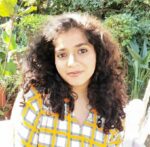
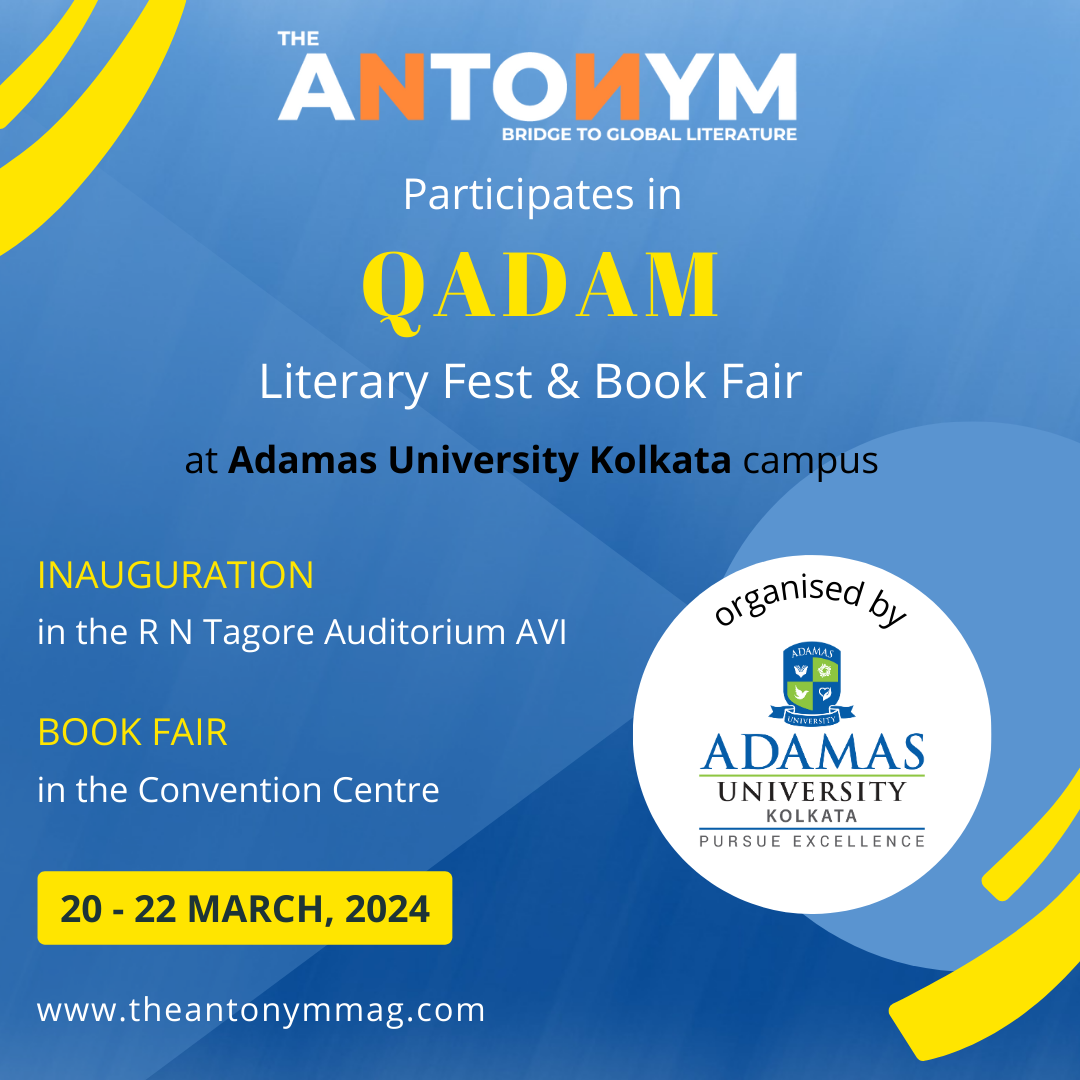
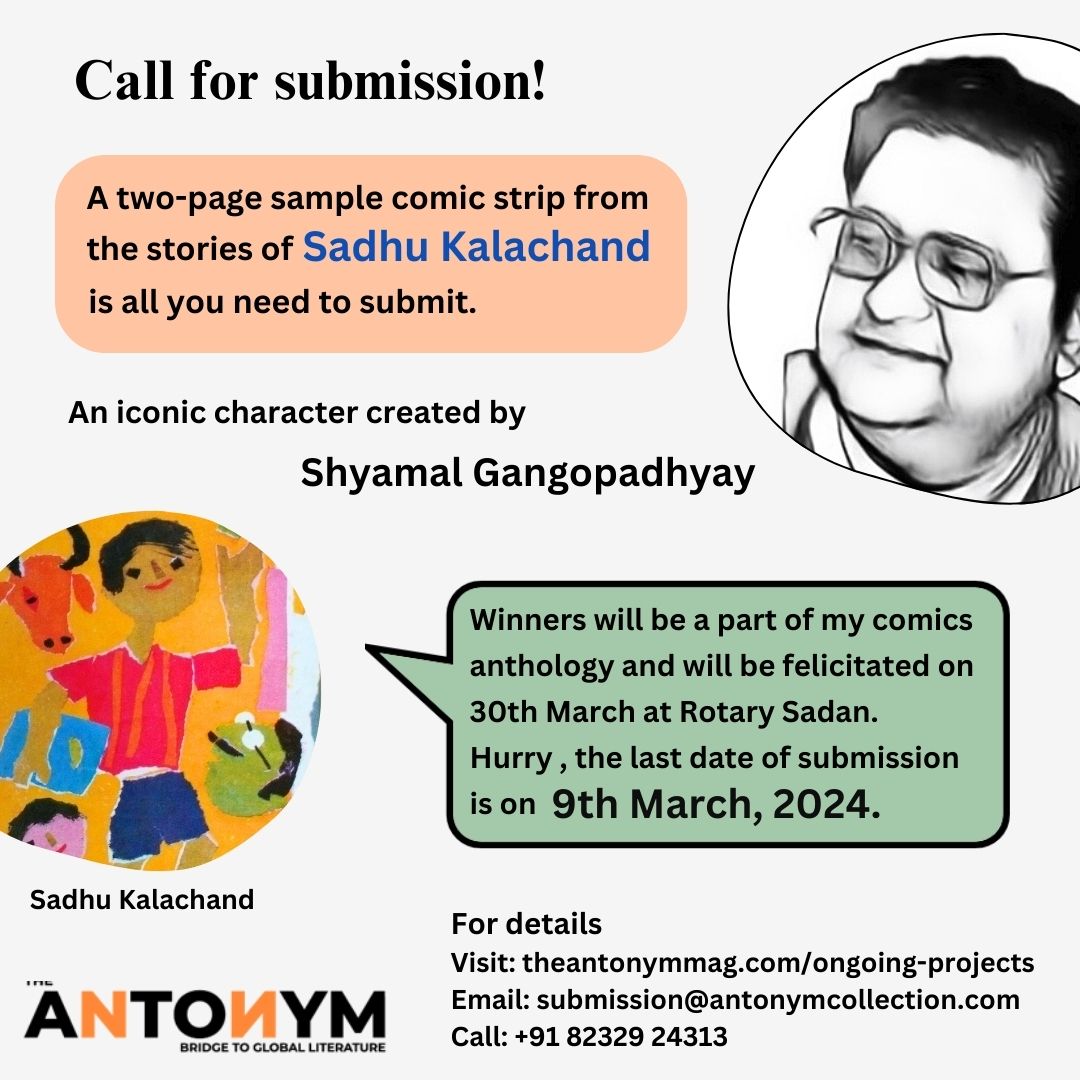
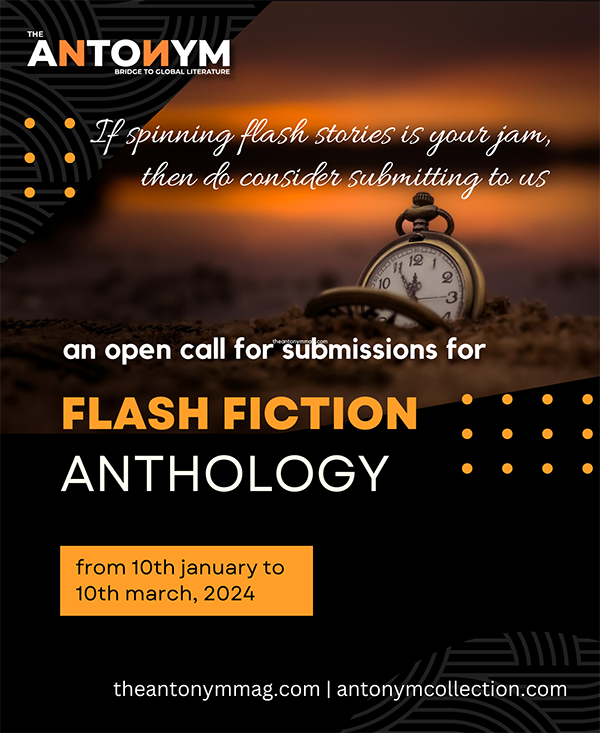








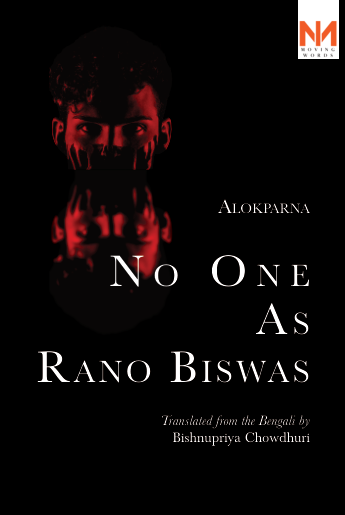

















0 Comments